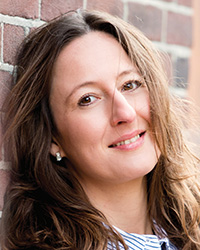Back Page: Redefining ‘Academic Superstardom’
 Your work advances our understanding of mental disorders from a network perspective — how did you come to this line of research? (Did you start with an interest in clinical issues? Or did the interest begin with statistical modeling?)
Your work advances our understanding of mental disorders from a network perspective — how did you come to this line of research? (Did you start with an interest in clinical issues? Or did the interest begin with statistical modeling?)
I started with an interest in clinical issues, forensic psychology in particular. During my Research Master I did my internship in a forensic psychiatric hospital, comparing low versus high psychopathic patients on their performance in the Iowa Gambling Task, a measure of how people process risk and emotion. My methodological interest was sparked during this time period: I loved the methods courses but I also became increasingly frustrated with the way in which mental disorders were conceptualized.
You already have many achievements in publishing, grants, and fellowships. Recently, you wrote about the importance of “slow science” and about being able to take time to think about “big” questions. Are the two compatible?
The two things are not inherently incompatible, but the combination requires the development of a particular skill: saying “no.” That is, in order to carve out the time needed for thinking about “big” questions, I think it is essential to pick one’s battles, guided by one’s personal goals. For example, I do not review 30 papers per year and I do not accept every collaboration request. In addition, I block time in my calendar during which I’m not available for meetings; that is my research time. I realize that this is easier said than done, especially if one is still on the tenure track, as the system seems to require from us that we do it all and at a near-perfect level.
You were recently elected to the Young Academy of the Royal Netherlands Academy of Arts and Sciences — are there particular goals or issues that you hope to address as a member?
One important goal is to think critically about and initiate change in our current academic system. Comparing academia to one big soccer team, I think that we always will have [Cristiano]
Ronaldo-like academic superstars. However: 1) we live in the illusion that there is only one definition of an academic superstar (e.g., many grants, publications in top journals, etc.); and 2) we are not doing very well in terms of rewarding colleagues who are essential for the success of a team yet are not attackers but, say, left defenders.
As a scientist who also maintains a public presence through ongoing blogs and columns, you clearly value science communication. Do you think the field is changing in how it views/values these kinds of nonresearch (“extracurricular”) activities?
Yes, the field is changing; nonresearch activities are increasingly appreciated. On the one hand, rightly so: It is important to, wherever relevant, communicate with a larger audience. We are paid by them to do our jobs. On the other hand, I worry that nonresearch activities will become yet another performance box that has to be ticked in order to advance one’s career. We have far too many boxes to tick already: Engaging in science communication should be an added bonus to one’s profile, not a requirement, and certainly not an HR instrument.
You’ve written about “impostor feelings” and how they are very common but little discussed. How do we make owning and sharing imperfections — the so-called “CV of failures” — more acceptable? How have you dealt with your own impostor feelings since writing about them?
Being frank about one’s own imperfections is a modest yet meaningful way to start. Just bring your whole person to work, not the vignette that is represented in your CV. I readily share my personal story with colleagues — for example, the fact that I have suffered from burnout. It also would be helpful if various application forms — for grants, nominations, etc. — would include a paragraph in which one is asked to reflect on fruitful areas for personal growth, or on grants/nominations that did not pan out. How I deal with my impostor feelings? Trying to accept that they are there.





APS regularly opens certain online articles for discussion on our website. Effective February 2021, you must be a logged-in APS member to post comments. By posting a comment, you agree to our Community Guidelines and the display of your profile information, including your name and affiliation. Any opinions, findings, conclusions, or recommendations present in article comments are those of the writers and do not necessarily reflect the views of APS or the article’s author. For more information, please see our Community Guidelines.
Please login with your APS account to comment.